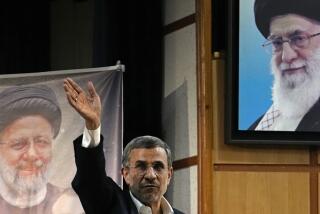Sudan’s Ex-Premier Makes Case for Democracy With Self-Exile
- Share via
CAIRO — One day before his daughter’s wedding, Sudanese opposition leader and former Prime Minister Sadek Mahdi slipped out of his house in Khartoum before sunrise dressed for horseback riding. Instead, he made a beeline across the rocky desert for the Eritrean border 320 miles to the east.
At prearranged points, he met up with fellow conspirators, armed to defend themselves if necessary, and they crossed the frontier undetected, welcomed by supporters on the other side.
Sudan’s governing elite--including the country’s parliament speaker and effective ruler, Hassan Turabi--had been invited to the wedding. When they arrived, they were told that Mahdi was down with the flu.
The next day, Dec. 11, Mahdi surprised them by surfacing in the Eritrean capital, Asmara, declaring that he had gone into exile to lead a campaign against the regime from abroad.
Cairo is the first stop on a tour of capitals that Mahdi said he is making to call attention to the opposition’s demands for a restoration of democracy in his homeland, a poverty-ridden, war-torn nation of 26 million that bridges the Arab and African worlds.
Interviewed this week in the Cairo hotel where he is being guarded by Egyptian security, the elegant, red-bearded Mahdi said he no longer wanted to be a “human shield” for Khartoum’s 7 1/2-year-old Islamic government, which is accused of being a prime sponsor of international terrorism.
As the country’s best-known dissident, Mahdi said, he had been warned that he would be held liable for anything done by anti-government forces, inside or outside the country.
“I have decided to deprive them of this particular lever,” he said.
So far, Sudan has made light of the defection, saying it would not “frighten the revolution.”
A fixture in Sudanese politics since the 1960s and twice prime minister, Mahdi has a hereditary claim to leadership. He is the great-grandson of the famous Mahdi of Sudan, the religious-political leader whose dervish forces annihilated the British garrison in Khartoum in 1885. They killed Cmdr. Charles Gordon, portrayed by Charlton Heston in the Hollywood film “Khartoum.”
Today’s Mahdi leads Sudan’s Umma Party and is imam of the powerful Ansar Sunni Muslim sect. He is an Oxford-educated, well-spoken proponent of liberal democracy who, at age 60, plays tennis and polo twice a week.
Government foes, now united in an umbrella group known as the National Democratic Alliance, believe that Mahdi’s flight could be a pivotal moment leading to the fall of Turabi and President Omar Hassan Ahmed Bashir, the general who led the 1989 coup that ousted Mahdi as prime minister.
Mahdi said Islamic governance has proved a failure and that time is running out for Turabi, who is his brother-in-law. Mahdi cited rising political, economic, diplomatic and military pressures.
One of the world’s poorest countries, Sudan has alienated foreign donors with its militant Islamic policies. Relations with its neighbors are rocky. Last year, the United States shut its Khartoum embassy to signal displeasure.
Egypt, the strongest regional power, is lined up against Khartoum, accusing it of harboring assassins who unsuccessfully attacked President Hosni Mubarak’s motorcade in Ethiopia in 1995. (The Sudanese government denies any role.)
Recently, Eritrea-based Sudanese guerrillas have been harassing government forces in eastern Sudan, adding to a long-running insurgency in the south.
“At a certain point, I think there will be a national popular uprising,” Mahdi predicted. “The army will side with the people.”
Mahdi left behind letters to Turabi and Bashir proposing that they relinquish power peacefully and join a transitional government leading to multi-party elections and a new constitution.
To solve the decades-long civil war between the Arab Muslim north and mainly black Christian guerrillas in southern Sudan, Mahdi said, the opposition would hold a plebiscite--”just like what happened in Quebec”--on whether the south wants to be part of Sudan.
“People will be offered unity on the basis of justice,” he promised.
More to Read
Sign up for Essential California
The most important California stories and recommendations in your inbox every morning.
You may occasionally receive promotional content from the Los Angeles Times.










